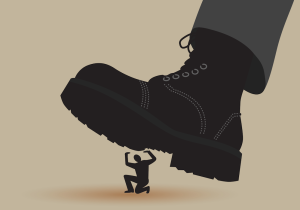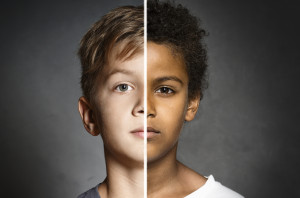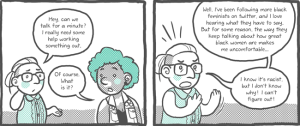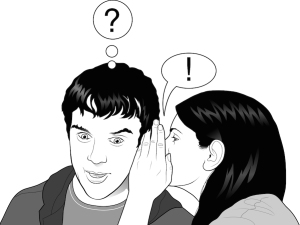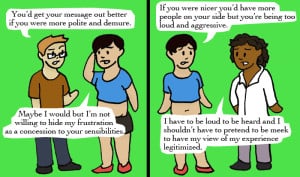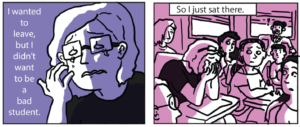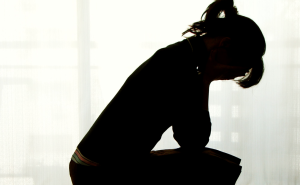Originally published on Adios Barbie and republished here with their permission.

A person wearing a dark-hooded jacket appears worried, with their hands laced and touching their face.
I can’t tell you how many times someone has said something judgmental about “people taking anti-depressants” to my face.
Hi! That’s me!
And with 15–23% of the overall population per state in the US taking some form of mental health medication, likely at least a few people you know are on anti-depressants as well.
So why do we put up with so much discriminatory, stigmatizing language around people who take them?
Regardless of someone’s personal beliefs about antidepressants, no one has a right to be judgmental, patronizing, or stigmatizing about someone else’s choices. Anti-depressants are an important part of mental health care for some people, and it’s about time we stop criticizing people for taking care of themselves.
Below are seven things NOT to say to people who take anti-depressants — or better yet, not to say at all.
1. “If I were depressed, I would never go on anti-depressants.”
Are you depressed? Nope?
STOP TALKING.
Don’t put yourself into shoes you’ve never worn.
2. “Anti-depressants should really just be a last resort.”
Wow! You must be a mental health expert! Oh wait, you aren’t. (Unless you are, but most people who are would never say this.) So maybe stop acting like you know what’s best for other people. Thanks!
There are about a thousand things wrong with this sentence. First of all, saying what others “should” do implies you know what’s best for their mental health. People who don’t have mental health problems cannot know what people experiencing them should do better than those people themselves.
This is just as patronizing as telling women not to drink “just in case” they get pregnant, telling people with eating disorders to “just eat!” and regulating women’s bodies to a ridiculous degree.
People suffering from depression are still smart, capable human beings. I have depression, and I am also perfectly able to make decisions for myself, thank you very much. Let’s quit it with the “should”s!
3. “But there are just so many natural ways to combat depression.”
Dude, there totally are. And if they work for you, that’s great!
However… many times, they don’t. I’ve done yoga. I’ve meditated. I’ve taken herbs and supplements. I’ve gone to therapy. I exercise nearly every day, and I have a wonderful family, group of friends, and partner.
Guess what: Without medication, I’m still depressed.
And while natural remedies can be great, they aren’t always easy to incorporate into your life.
Yoga takes a couple hours a week, and not everyone’s body is physically capable of doing yoga. Meditation requires a time of peace and quiet. Not everyone has this regularly. Natural remedies can also be expensive!
Not counting medication (which is about $3 per month with my insurance) I’ve spent over $110 on other mental health-related things each month in an effort to take care of my depression “naturally.” I am fortunate to be able to shell this out, but for some people it’s next to impossible.
Asking people to try all these remedies first before turning to something that can be incorporated into their life relatively easily comes from a place of privilege.
Anti-depressants can also make it possible for someone to get to a point where they can adopt other practices that may help combat depression later.
One of the symptoms of clinical depression is an extreme lack of motivation. So going to yoga three times a week for a month to see if it helps might not be realistic.
4. “Anti-depressants are unnatural and have harmful side effects.”
A lot of people believe that taking anti-depressants is wrong and unnatural. As someone once said to me, “They, like, affect your brain!”
No shit.
You know what else affects your brain? Sleep. Caffeine. Sugar. Alcohol. Sex. Other drugs that people might call you “cool” for taking.
Sometimes, yes, anti-depressants can cause undesirable side effects. That, however, is an issue between the person taking them and their healthcare provider.
That is not your problem or your business. And it’s definitely not a reason to judge anyone for their personal choices about whether or not a medication works for them.
Even if an anti-depressant didn’t work for you, you don’t have the right to poo-poo the fact that it helps other people.
5. “Anti-depressants are so overprescribed.”
Yes. In recent years, anti-depressant use has skyrocketed, and concerns over some people taking them without a diagnosed mental health problem have arisen.
When this is said to people who are depressed and on medication, it usually comes with a tone of judgment, insinuating that they’re making an uneducated decision about their mental health.
This concern of overdiagnosing and prescribing still, in no way, negates the fact that anti-depressants really do help people with mental health problems.
6. “People on anti-depressants…”
STOP.
Lumping any group of people into one and making overarching judgments about them is dangerous.
It creates stereotypes and discounts the extremely varied experiences of people taking antidepressants.
7. “Taking anti-depressants is the easy way out.”
I’m sorry, since when is anything about depression easy?
Are YOU depressed? If not, return to point No. 1.
I can’t stand the idea that people who don’t have depression somehow think those who do should have to “take the harder way out.”
For me, anti-depressants have been an equalizer — they’ve gotten me to a place where I feel on par with other people who are lucky enough not to suffer from mental illness.
Wanting relief from a debilitating mental health issue is completely justified, and asserting that this relief shouldn’t be “easy” perpetuates the inequities that people with mental illness face.
***
People living with mental health issues deserve respect for themselves and the decisions that they make for themselves. Though the statements listed above are common, they’re also harmful and hurtful to folks taking anti-depressants for mental health.
By not passing judgment on these decisions, we can help create environments and relationships in which people feel safe and empowered to make the mental health decisions that are right for them.
[do_widget id=’text-101′]
Search our 3000+ articles!
Read our articles about:
Our online racial justice training
Used by hundreds of universities, non-profits, and businesses.
Click to learn more







